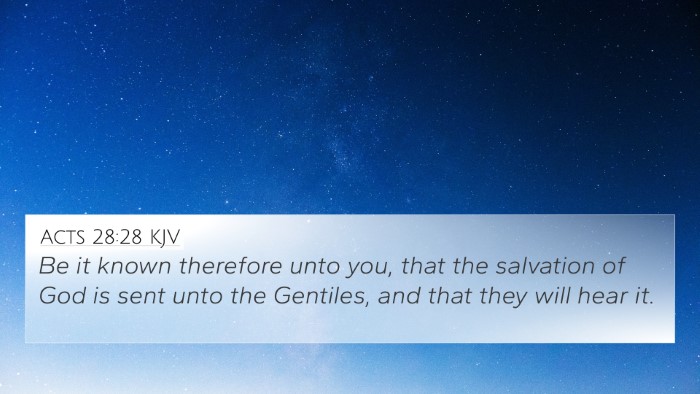Understanding Acts 13:42
Acts 13:42 states:
"And when the Jews were gone out of the synagogue, the Gentiles besought that these words might be preached to them the next sabbath."
Overview of the Verse
This verse highlights a significant moment in the early church where the message of the Gospel begins to spread beyond the Jewish community to the Gentiles. It reflects the openness of the Gospel message and the desire of the Gentiles to hear God's word.
Commentary Insights
- Matthew Henry: Matthew Henry emphasizes the eagerness of the Gentiles to hear the preaching of the Gospel. He notes that this eagerness demonstrates the universal call of Christianity, which transcends cultural and ethnic barriers.
- Albert Barnes: Albert Barnes comments on the reaction of the Gentiles, highlighting their desire for spiritual truth. Barnes points out that the Jews’ departure from the synagogue was also significant, indicating a shift in the missional focus towards the Gentiles.
- Adam Clarke: Adam Clarke notes the importance of the Sabbath in this context, as it provided a regular opportunity for teaching and fellowship. He explains that the Gentiles’ request reflects a hunger for God’s word that was often absent among the Jews themselves.
Connections Between Bible Verses
This verse can be cross-referenced with several other Scriptures that illustrate the broader themes present in Acts 13:42. Below are some notable connections:
- Matthew 28:19-20: The Great Commission calls for the disciples to make disciples of all nations, echoing the theme of inclusive Gospel outreach.
- Luke 4:25-27: Jesus speaks of the ministry to Gentiles, emphasizing God's mercy beyond Israel.
- Acts 10:34-35: Peter realizes that God shows no partiality and accepts Gentiles who fear Him.
- Romans 1:16: Paul declares that the Gospel is the power of God for salvation to everyone who believes, first to the Jew and then to the Gentile.
- Galatians 3:28: In Christ, there is neither Jew nor Gentile, highlighting unity in the faith.
- Ephesians 2:11-13: Paul speaks about Gentiles being brought near by the blood of Christ, emphasizing reconciliation.
- John 12:20: Greeks wanting to see Jesus reflects the broader interest of Gentiles in Christ.
- Romans 10:12-13: Similar to Acts 13:42, it emphasizes that anyone who calls on the name of the Lord will be saved, without distinction.
- Acts 15:19-20: The early church's decision to send the Gospel to the Gentiles shows an understanding of their inclusion in God's plan.
- Isaiah 49:6: A prophetic declaration that God's salvation would reach to the ends of the earth, anticipating the moment expressed in Acts 13:42.
Reflections on Thematic Bible Verse Connections
The theme of inclusion is distinct throughout scripture, encouraging believers to reflect on how God’s message transcends traditional barriers. The desire of the Gentiles for the Gospel indicates a growing recognition of the need for spiritual truth, and it serves as an important reminder for contemporary believers about the openness and accessibility of the Christian faith.
Comparative Bible Verse Analysis
When analyzing Acts 13:42 in light of related verses, we can observe how God's plan unfolds through the actions of both Jews and Gentiles. The desire of the Gentiles to receive the teachings of Jesus opens up critical discussions regarding the early church's outreach and mission strategies.
Cross-Referencing Biblical Texts
Utilizing tools for Bible cross-referencing can enhance understanding of themes across different books. By cross-referencing Acts 13:42, readers can explore the narrative of salvation history and its implications for both Jews and Gentiles. This process of scriptural cross-referencing allows for deeper insights into God's overarching plan.
Conclusion
In summary, Acts 13:42 serves as a pivotal moment highlighting the open invitation of the Gospel. The receptivity of the Gentiles to the preached word serves as a model for evangelism and emphasizes that the message of Christ is for all, regardless of background. As believers continue to explore cross-references and connections within scripture, they enrich their understanding and appreciation of God’s work throughout history.








